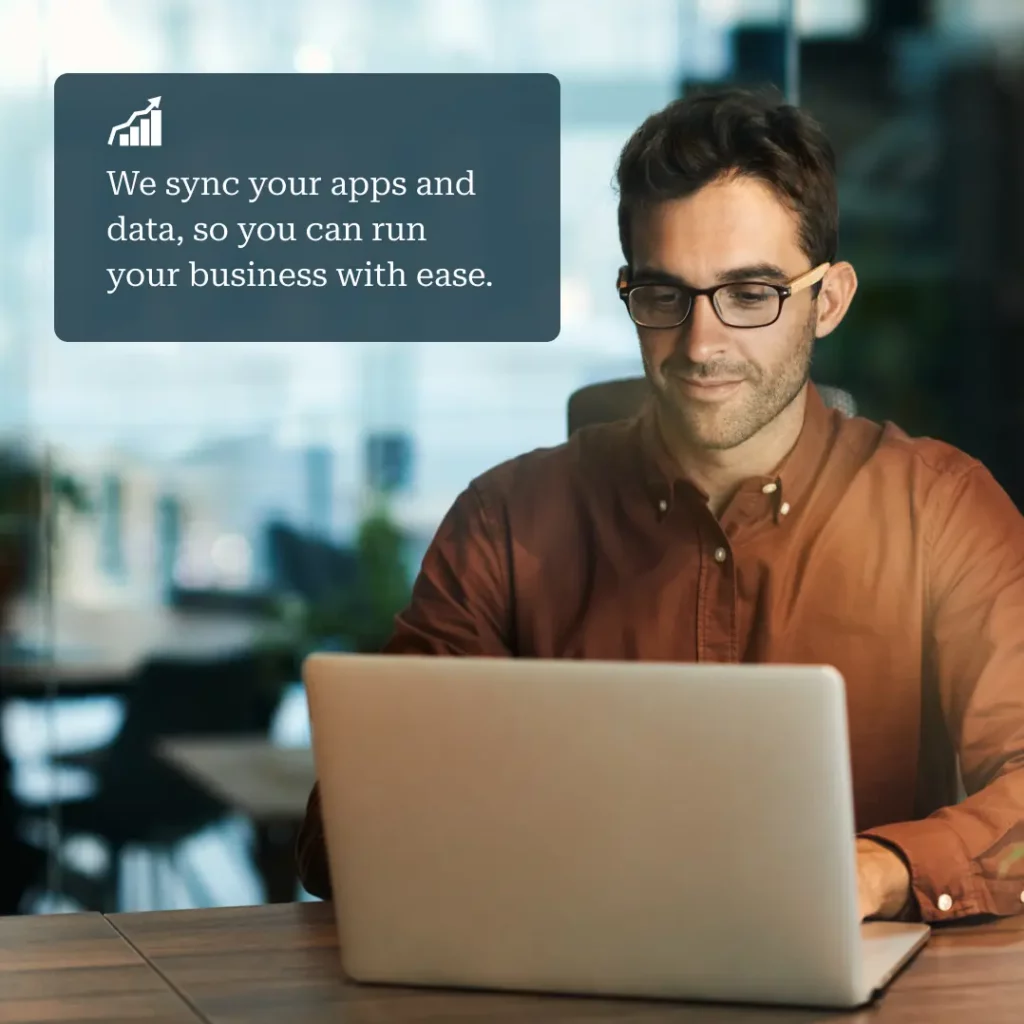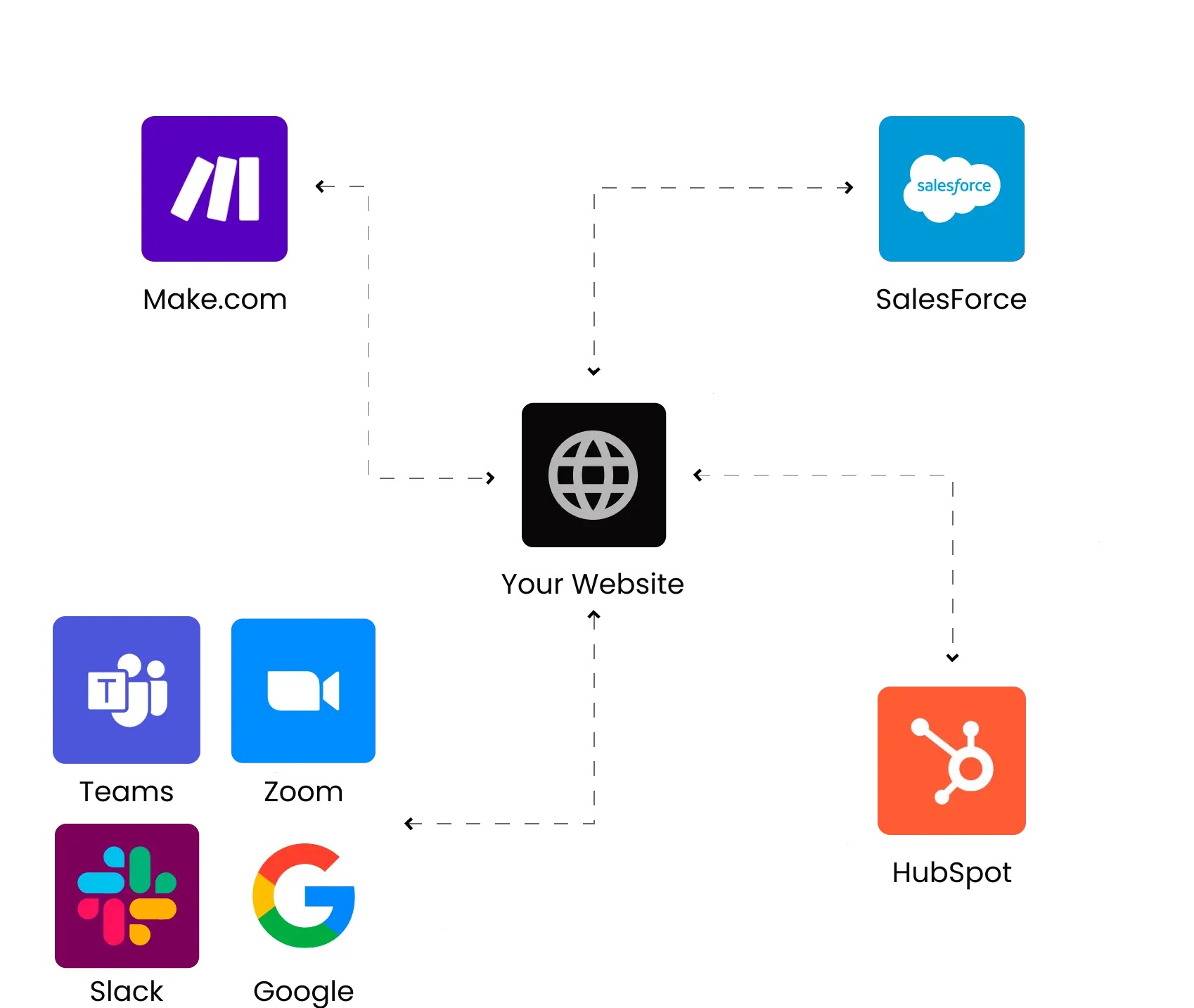API Integration Services
Our API integration services connect your site to the tools and platforms you rely on—like payment systems, CRMs, or custom solutions—so everything runs smoothly and seamlessly. Whether you’re looking to save time, improve functionality, or give your visitors a better experience, we’re here to help. Let’s work together to create a website that does more for you.

Seamless API Integrations for a Smarter Website
Connect, Automate, and Elevate Your Business
Don't miss a beat with seamless integrations
Get all of your third-party tools connected to your website.
Types of API Integrations We Offer
Public (Open) APIs
Public APIs, also known as open APIs, are available to developers and businesses without restrictions. These APIs are designed for external users, including third-party developers, who can access them with minimal authorization requirements.
What are the benefits of integrating a Public API into my website?
Integrating APIs is one of the best ways to improve your website’s functionality and performance. Since public APIs have their own team of developers who maintain it, you can rest assured that the security, software, and best practices are secure and up-to-date. The best part is public/open-source APIs are completely free, so you don’t have to worry about budgeting for expensive development. Using APIs to handle things like payments, customer management, or live data updates allows you to benefit from more automation, less manual work, and a smoother experience for you and your users.
Are Public APIs safe to use on my website?
What are some common Public APIs I can integrate into my website?
There are many APIs with free tiers that can enhance your business website by adding functionality like analytics, automation, payments, customer engagement, and more. For data and analytics, the Google Analytics API provides insights into your website traffic and user behavior. IPinfo helps with IP-based geolocation to personalize content for your users.
For payments and e-commerce, we can integrate the Stripe API to accept payments and manage transactions seamlessly.
When it comes to customer engagement and communication, the Twilio API provides SMS and voice message capabilities, SendGrid API allows you to automate transactional and marketing emails, and the HubSpot API offers CRM, marketing, and sales automation with a free-tier contact management system.
For chatbot and AI-powered interactions, the ChatGPT API (OpenAI) can be used to automate customer interactions, while the Dialogflow API (Google) provides AI-powered chatbot services. If you’re looking for live chat solutions, the Tidio API offers chatbot and live chat functionality.
For location-based services, the Google Maps API provides mapping and location services to enhance user experience on your website.
If you want to streamline productivity and automation, the Zapier API connects different business apps for seamless workflow automation. Additionally, the Airtable API enables database and spreadsheet automation.
Partner APIs
Partner APIs are typically SaaS solutions designed for business partners or customers. Partner APIs require authentication and authorization, and they may also require the use of specific protocols or methods of communication. These APIs are typically used to provide access to data or services that are not intended for broad consumption.
What is the difference between a partner API and a private API?
Partner APIs are shared externally, but only with authorized business partners or clients. It’s a restricted API that allows companies to share data. Partner APIs are often used to enable third-party services and provide access to specific functionalities.
On the other hand, private APIs are typically internal within a company and maintained in house.
What are examples of common partner APIs?
Many businesses use Partner APIs to improve their operations, customer relationships, website functionality, transactions, and more. With technology today, there’s an API for pretty much anything you can imagine. Luckily, many partner APIs offer a free tier.
Examples of common partner APIs include:
- Stripe API – used for online payments, subscriptions, and financial reporting.
- Shopify API – allows businesses to manage online stores, products, and customer data.
- Twillio API – used for customer communication (SMS, voice, and chatbot solutions)
- SendGrid API – used to automate transactional and marketing emails.
- HubSpot API – used for customer relationship management and marketing automation.
- Intercom API – used for live chat and support tools.
- Google OAuth API – used for user authentication and login services.
Can you integrate a partner API into my website?
Internal (Private) APIs
Can WebXd integrate an Internal API into my website?
Yes! We can integrate your internal company API into your website. To learn more, schedule a free consultation to speak with an expert.
Will an Internal API integration slow down my website?
No. Internal APIs operate behind the scenes to facilitate real-time data exchange. When connected correctly, there should be no impact on your website’s speed or user experience.
How long does it take to integrate an Internal API?
Composite APIs
Composite APIs combines multiple API requests into a single call, reducing the number of interactions needed between systems. This improves performance, speeds up data retrieval, and enhances user experience by streamlining complex processes on your website.
How can Composite APIs improve my website’s functionality?
Can WebXd integrate Composite APIs into my website?
Will Composite APIs help my website load faster?

Why work with us?
- Expertise & Experience – Our team of developers specializes in building and integrating APIs across different industries.
- Custom -Tailored Solutions – Every business has unique needs, so we offer custom API integration to fit your specific goals.
- Enhanced Automation – Reduce manual work by integrating APIs that handle your website functions.
- Improved User Experience – Ensure faster processing, seamless interactions, and real-time data updates for your customers.
- Security & Reliability – We follow best security practices to protect your data and ensure reliable system connections.
- Scalability & Future-Proofing – As your business grows, we ensure that your APIs can scale and adapt to your evolving needs.
100%
SETUP BY WEBXD
$500K+
BUILT-IN VALUE
1 Billion+
DATA POINTS

Make Your Website Do More with Powerful API Integrations
Transform Your Website’s Performance with API Integrations
Without APIs
(Old & Outdated Approach)
vs.
With APIs
(Modern & Efficient Approach)
Data Management

Manual data entry leads to errors, redundancy, and inefficiency.

APIs automate data exchange, ensuring accuracy, consistency, and real-time updates.
User Experience

Limited interactivity, slow responses, and static content.

APIs enable dynamic, personalized experiences.
Scalability

Requires constant manual upgrades and complex coding to add new features.

APIs allow easy integration of new tools and services, making scaling effortless.
Automation

Manual workflows slow down operations and increase human errors.

APIs automate tasks like payment processing, customer support, and data synchronization.
Third-Party Services

Requires separate logins and switching between platforms for payments, analytics, and CRM.

APIs connect external services directly, creating a unified, seamless experience.
Security

Sensitive data may be stored in multiple locations, increasing risk.

APIs follow secure authentication protocols (OAuth, API keys) to safeguard data.
Speed & Performance

Websites rely on local storage and manual updates, causing delays and downtime.

APIs follow secure authentication protocols (OAuth, API keys) to safeguard data.
Development Costs

Developers reinvent the wheel by coding everything from scratch, increasing time and costs.

APIs reduce development costs by leveraging pre-built solutions.
Integration with Other Platforms

No easy way to connect CRM, social media, or e-commerce tools.

APIs seamlessly integrate platforms like Salesforce, Stripe, and Facebook.
Competitive Advantage

Outdated technology leads to poor customer retention and limited growth.

APIs keep businesses competitive by enabling innovation, automation, and data-driven decision-making.
Are you ready for your transformation story?
Our Work

Case Study | Good Life Property Management
How our migration to WordPress & SEO led to a 438% increase in website traffic.

Case Study | Wholesale Warranties
How we doubled Wholesale Warranties conversions with our website redesign

Case Study | Advanced Image Robotics
How our website redesign increased website engagement by 168%
Frequently Asked Questions
How do API integrations improve my business operations, and are they worth the investment?
Is my business too small to benefit from API integrations, or are they only for large enterprises?
How secure are API integrations? Will my data be safe from breaches or unauthorized access?
Yes, properly implemented API integrations are highly secure. Using methods like encryption, authentication tokens, and secure communication protocols ensures that robust security measures are in place to safeguard your sensitive data. Regular monitoring and updates further protect against evolving threats.




